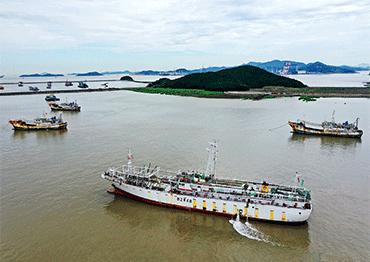According to Professor Chen Xinjun, president of the College of Marine Sciences at Shanghai Ocean University, the declining catch is due to two reasons - overfishing of juvenile squid and climate change.
Chen told NewsChina that unlike most common fish species which are hunted, squid has a relatively short life span and a very high reproduction rate. Both Humboldt squid and Argentine shortfin squid have a life span of about one or two years, and they typically die after spawning.
While Humboldt squid spawn year round, with two peaks from February to April and September to November, Argentine shortfin spawn mainly in July and August.
With the closed seasons announced by China covering the spawning period for Argentine shortfin squid and one of two peaks for Humboldt squid, Chen said that the temporary ban can help squid populations bounce back quickly.
As for the impact of climate change, Chen said that the accelerated melting of ice sheets in the Antarctic may cause increased die-off of juvenile squid. But more importantly, ice sheet melt causes changes in ocean currents, resulting in the change of the location of fisheries. Overall, Chen said that the catch in the traditional fishing grounds of the southwest Atlantic is declining. But squid populations within Argentina’s exclusive economic zone (EEZ) and the waters around the Falkland Islands have increased.
Huang Baoshan, director of the China Distant Water Fishery Association, said that despite the likely impact of the closed seasons, most fishing businesses in China support the temporary ban. Huang told NewsChina that based on the experience of the Argentine government, which imposes a closed season between September and January in its coastal waters, the temporary ban has resulted in bigger squid sizes and greater overall catches.
According to Chen Bin, chief director of Zhoushan National Pelagic Fishery Base in Zhoushan, Zhejiang Province, the closed seasons will help push China’s increasingly obsolete trawler fleet out of the market. Chen told NewsChina that there are two types of fishing boats operating in the affected areas, squid jigging vessels and trawlers. While the former specializes in illuminated squid fishing, the latter drags its trawls, or nets, along the seabed, stripping it of all marine life. These trawler fleets have long been criticized for damaging the marine environment.
Chinese authorities have outlawed the construction of new trawlers, but there are still about 30 in China’s deep-sea fishing fleet.
Chen said that as trawlers operate year-round, the impact of the closed seasons will be much greater than for the squid jigging vessels, which usually operate for half the year. “The closed seasons could lead to a one-third reduction in annual catch for trawlers, which could push more trawlers out of business,” Chen said.

 Old Version
Old Version
